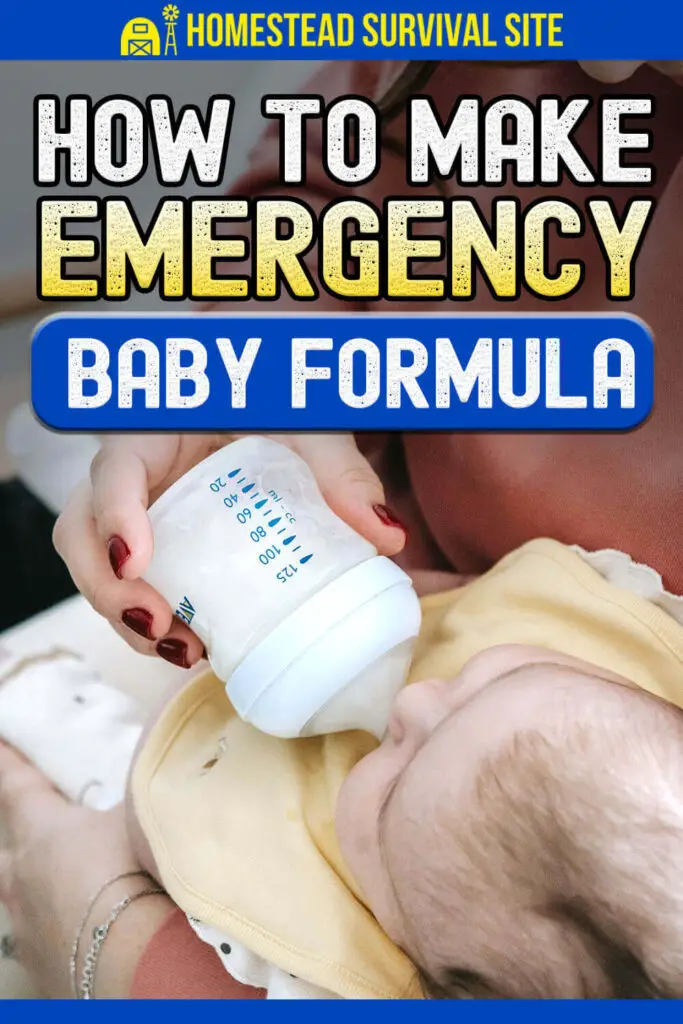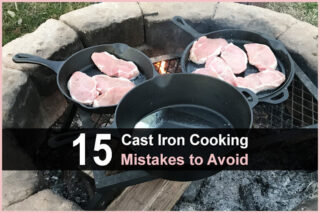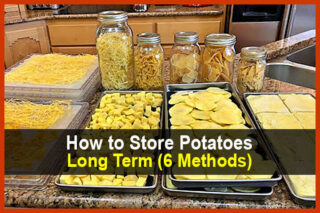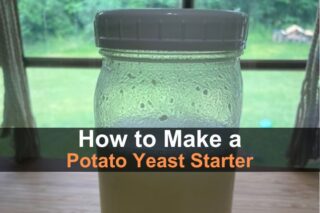Estimated reading time: 5 minutes
The recent nationwide shortage of baby formula put a spotlight on a critical supply parents need to consider during these uncertain times.
Earlier this year, the closing of a formula manufacturing facility in Michigan combined with ongoing pandemic-related supply chain issues set in motion the shortage that left supermarket shelves empty and parents struggling to feed their infants.
Although the Abbot Laboratories facility is back in operation and the supply of formula is meeting demand, unexpected events could cause a similar crisis in the future. Possible scenarios include a natural disaster or a water shortage – two situations that do not seem at all far-fetched these days.
This article will review ways to make emergency baby formula to help parents feel better prepared during a crisis.
First, here are a few disclaimers. This article is intended for informational purposes during an urgent short-term situation. Be sure to discuss any feeding changes with your child's pediatrician.
A baby's nutritional needs are very specific, and homemade formula may contain either too little or too much of certain vitamins and minerals. For example, homemade baby formula may not have enough iron or calcium, two minerals that are critical for healthy bone and brain growth. Also, homemade formula may carry an increased risk of infection.
Want to save this post for later? Click Here to Pin It On Pinterest!
If you run out of formula, one option is to seek out donated human breast milk. Local hospitals and birthing centers may be able to connect you with a mother's milk bank. Here are a few resources if you want to consider that route.
If donated breast milk is not an option, you can contact the following resources to see if they can help you find emergency baby formula:
Now, let's say the emergency is widespread, and the above options are not available. The following recipe is based on World Health Organization (WHO) guidelines and is meant for short-term use only.
Baby Formula Recipe #1
Prep Time: 5 minutes
Total Time: 5 minutes
Serving Size: 32 ounces (1 quart)
Ingredients:
- 1 13-ounce can of full-fat evaporated milk
- 2 ⅓ cups clean water (slightly warm)
- 2 TBS blackstrap molasses
Directions:
- Place all ingredients in a jar or blender. Close with a tight-fitting lid.
- Shake or blend well.
- Pour into a clean baby bottle and feed it to baby right away.
- Store any leftovers in the fridge for up to three days.
This recipe uses blackstrap molasses as the sweetener because it contains iron, sodium, and potassium.
If you prefer, you may substitute an equal amount of brown sugar, granulated sugar, dark corn syrup, or maple syrup.
Here is the nutritional breakdown for this emergency formula recipe (with blackstrap molasses):
- Calories: 552
- Total Fat: 28.5 g
- Saturated Fat: 17.3 g
- Cholesterol: 109 mg
- Sodium: 428 mg
- Total Carbohydrate: 50 g
- Dietary Fiber: 0 g
- Total Sugars: 50 g
- Protein: 25.7 g
- Vitamin D: 0 mcg
- Calcium: 1173 mg
- Iron: 4 mg
- Potassium: 1647 mg
Baby Formula Recipe #2
- 12 ounces evaporated milk
- 18 ounces boiled water
- 2 TB corn syrup (or sugar)
Combine all three ingredients and mix well.
Baby Formula Recipe #3
Ingredients:
- 1 cup cooked brown rice
- 4 cups purified water
- 2 TB granulated sugar or 1 TB light corn syrup
- 1 tsp. nutritional yeast (optional)
Directions:
- Place all ingredients in a blender.
- Blend until the mixture has liquified.
- Refrigerate any leftovers and use them within 48 hours.
Other guidelines for emergency baby feeding
Here are a few don'ts to keep in mind when feeding your baby during an emergency:
- Do not use sweetened condensed milk as it is high in sugar content.
- Do not use honey as a sweetener if your baby is under 12 months old.
- Do not water down formula to make it last longer. This practice reduces the nutritional content.
- Do not use plant-based milks (like almond, coconut, rice, or oat milk) or goat milk if your baby is younger than 12 months.
- Do not give cow's milk to children under six months.
And here are a few dos from the Department of Health and Human Services (HHS).
- If you are without formula in a crisis, you can give your baby oral rehydration solutions (such as Pedialyte or Enfalyte) for a few days.
- Babies who are around six months old can eat finely ground foods.
- Babies 12 months and up do not need formula.
Cow's milk does not have the right amount of nutrients a human baby needs and contains too many minerals and proteins for a newborn baby's kidneys to handle. However, according to HHS, you may be able to give your baby some pasteurized, unflavored, whole cow's milk under the following your conditions:
- Your baby is at least six months
- Your baby drinks regular formula (not specialty formulas)
- Your baby is able to eat some solid foods
- You cannot find formula
Once again, cow's milk would be a temporary solution under these circumstances, and you should consult your child's doctor. Soy milk may be an option for children nearing the age of one.
Also, according to the American Academy of Pediatricians, in an emergency you can give your baby formula that is not designed for their age group. For example, you can provide toddler formula to a younger child, or you could give premature baby formula to a full-term infant.
Keep in mind that whenever you change your baby's diet, you should expect some tummy upset at first. You may want to have some infant gas drops or probiotic drops on hand to help with any digestive issues that may develop.
Like this post? Don't Forget to Pin It On Pinterest!













is the calorie breakdown for recipe 1 for the entire quart or for a “serving” ?